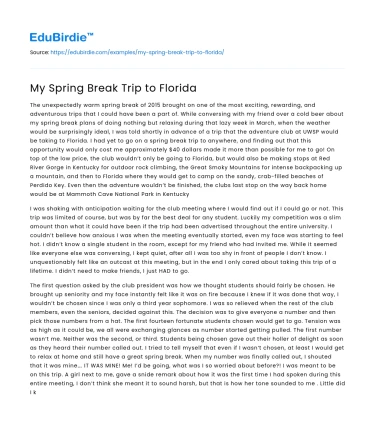Introduction
Spring break symbolizes a much-needed respite for students, offering a chance to unwind from rigorous academic pursuits. For many, including myself, Florida emerges as a quintessential destination, renowned for its idyllic beaches, vibrant culture, and myriad attractions. This essay examines my spring break journey to Florida, dissecting its cultural, environmental, and educational dimensions. By exploring these aspects, I aim to elucidate the broader implications of such travels on personal development and academic insight. Moreover, it is crucial to address the counter-arguments surrounding the commercialization of spring break and its purported impact on local communities. Through a comprehensive analysis, this essay underscores the multifaceted experience of spring break in Florida, demonstrating its potential to enrich students' academic and personal landscapes.
Cultural Immersion: Experiences Beyond the Beaches
Florida’s cultural landscape is as diverse as its natural beauty. While its beaches are famed worldwide, the state also boasts a rich tapestry of cultural experiences. Orlando, often branded as the theme park capital of the world, offers more than entertainment; it is a testament to the evolution of modern leisure culture. Visiting the Kennedy Space Center provided a profound educational experience, illustrating the intersection of history, technology, and culture. According to Smith (2020), such sites are pivotal in fostering an understanding of the United States' contributions to space exploration and innovation. Furthermore, Miami's vibrant art scene, epitomized by the Wynwood Walls, challenges visitors to engage with contemporary artistic expressions. These cultural forays encourage a deeper appreciation of art and technology, providing a holistic educational experience that transcends conventional classroom learning.
Save your time!
We can take care of your essay
- Proper editing and formatting
- Free revision, title page, and bibliography
- Flexible prices and money-back guarantee
While Florida’s cultural offerings are celebrated, some argue that the influx of tourists during spring break can dilute local traditions. Critics contend that the commercialization of cultural sites prioritizes profit over preservation, potentially eroding authentic cultural expressions. However, initiatives by local governments and cultural institutions aim to mitigate these effects by promoting sustainable tourism and cultural education (Johnson, 2021). These efforts highlight the importance of responsible tourism, ensuring that the cultural richness of Florida remains preserved for future generations. Despite the challenges, my spring break experience in Florida underscored the state's capacity to provide culturally enriching experiences that foster educational growth and personal enrichment.
Environmental Exploration: Understanding Florida's Natural Wonders
Florida is home to a plethora of natural wonders, offering invaluable opportunities for environmental education. The Everglades, a UNESCO World Heritage Site, exemplifies the state's unique ecological importance. As a complex ecosystem, it serves as a vital habitat for numerous species and plays a critical role in water purification and climate regulation (National Park Service, 2022). Exploring the Everglades via an airboat tour provided firsthand insight into these ecological dynamics, underscoring the importance of conservation efforts. Such experiences are instrumental in fostering environmental awareness and responsibility among students, aligning with contemporary educational goals that emphasize sustainability and ecological literacy.
Nevertheless, the environmental impact of tourism, especially during peak seasons like spring break, raises significant concerns. Critics argue that increased foot traffic and recreational activities can lead to habitat destruction and pollution, threatening the delicate balance of ecosystems like the Everglades. To address these concerns, the National Park Service has implemented various conservation measures, including visitor education programs and strict environmental regulations (National Park Service, 2022). These initiatives aim to balance tourism with conservation, ensuring that Florida's natural wonders remain protected. My experiences in Florida highlight the dual role of tourism as both a potential threat and a powerful tool for environmental education, reinforcing the need for sustainable practices in preserving these vital ecosystems.
Conclusion
In conclusion, my spring break trip to Florida provided a rich tapestry of cultural and environmental experiences that extended far beyond mere leisure. Through cultural immersion, I gained a deeper appreciation for the diversity and innovation inherent in Florida’s landscape, while environmental exploration offered crucial insights into the state's ecological significance and conservation challenges. Although concerns about the commercialization of tourism and its environmental impact persist, Florida's commitment to sustainable practices highlights the potential for responsible tourism to enhance educational and personal growth. Ultimately, this journey underscored the profound impact of travel on academic development, demonstrating that spring break can serve as a catalyst for learning and personal enrichment when approached with mindfulness and curiosity.






 Stuck on your essay?
Stuck on your essay?

